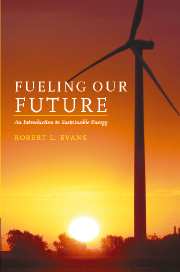5 - World energy supply
Published online by Cambridge University Press: 05 June 2012
Summary
WORLD ENERGY SOURCES
In Chapter 2 we noted that there are only three sources, or categories, of primary energy; fossil fuels, renewable energy, and nuclear power. The global consumption of energy, broken down into these categories, is shown in Figure 5.1a. It can be seen that almost 80% of all of our primary energy needs are supplied from fossil fuels. The distribution of energy supply by source is further broken down in Figure 5.1b, which shows the largest fossil fuel component of the overall global supply to be oil, followed by coal, and finally natural gas. In the renewable energy category by far the largest component is for combustible renewables and waste, which includes wood-waste and “black liquor” used to fuel boilers in the pulp and paper industry, for example, as well as other combustible biofuels such as firewood gathered by hand in developing countries. The remainder of the renewable energy supplied in 2002 consisted of hydroelectric power, accounting for 2.2% of global demand, while only about 0.5% of total energy demand (shown as “Other” in Figure 5.1b) was supplied from wind, solar, and geothermal power. These figures illustrate the overwhelming reliance that the world places on fossil fuels to satisfy our energy needs. Although crude oil is the largest source of energy, and is used primarily to provide fuel for transportation, we also consume large quantities of natural gas and coal, mainly to provide heat and to generate electricity.
- Type
- Chapter
- Information
- Publisher: Cambridge University PressPrint publication year: 2007



